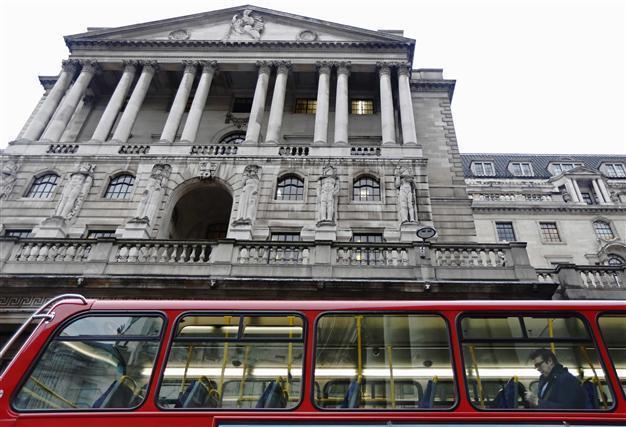Britain insists on austerity despite AAA loss
LONDON – Agence France-Presse

A man sits on a bus as it passes the Bank of England in the financial district of the City of London January 29, 2013. REUTERS photo
The United Kingdom will not abandon deficit-cutting drive after Moody’s stripped the country of its coveted triple-A debt rating, British finance minister George Osborne said on Feb. 23.
The opposition lashed Osborne, saying his plan for the economy was shot through, while analysts said that although it was an embarrassment for him, the downgrade would have a limited impact in the markets.
In an expected rebuff to London’s hopes that sharp spending cuts would both gradually eliminate the deficit and revive growth, Moody’s rating agency cut Britain’s grade by one notch to Aa1 on Feb. 22.
Osborne said it was a “loud and clear message that Britain cannot let up in dealing with its debts, dealing with its problems, cannot let up in making sure that Britain can pay its way in the world.
“What is the message from the ratings agency? Britain’s got a debt problem. I agree with that. I’ve been telling the country for years that we’ve got a debt problem, we’ve got to deal with it. What do they also say? That if we abandon our commitment to deal with that debt problem, then our situation would get very much worse and I’m absolutely clear that we must not do that.”
Asked if he had broken his commitment to protecting Britain’s credit rating, he said the true test of credibility was whether Britain could borrow money. “At the moment we can do that very cheaply with very low interest rates precisely because people have confidence that we have got a plan,” he said.
Moody’s said government debt was still mounting and that growth was too weak to reverse the trend before 2016.
It described the British economy as constrained both by turgid global growth and the drag from businesses and the government rapidly slashing their debt burdens.
Calling it a “humiliating blow”, Labour opposition finance spokesman Ed Balls said Osborne had failed in his chief stated mission of retaining Britain’s AAA status.
“The reality is an economy which is not growing, a deficit which is getting bigger, families in real stress and a government which is ploughing on regardless with a plan which is not working,” he told BBC television.
“Saying ‘the medicine is not working, let’s increase the dose of the medicine’ - that is completely crazy economics.” However, Howard Archer, chief UK economist at IHS Global Insight research group, said that the market had been anticipating the downgrade for some time, though Britain’s pound sterling currency may be vulnerable.
“It does focus attention on the UK economy’s extended and ongoing serious problems. The loss of the AAA rating certainly puts pressure on Mr Osborne to come up with more initiatives in the (March 20) budget to try and boost growth,” he said.
“While an embarrassment for the government and a cause for piqued pride, we suspect that the loss of the AAA rating will have only a limited negative impact for the UK economy.” Mark Littlewood, director general of the Institute of Economic Affairs free-market think-tank, said: “The damaging impact of ballooning national debt, public spending raging out of control and tax rises should not be underestimated.
“Taking immediate action to tackle the deficit must now be the priority. George Osborne should focus on making sufficient savings in public spending to implement a substantial programme of tax reductions,” Meanwhile Howard Wheeldon, senior strategist at stockbrokers BGC Partners, said the downgrade was not a reason for an economic policy change.
